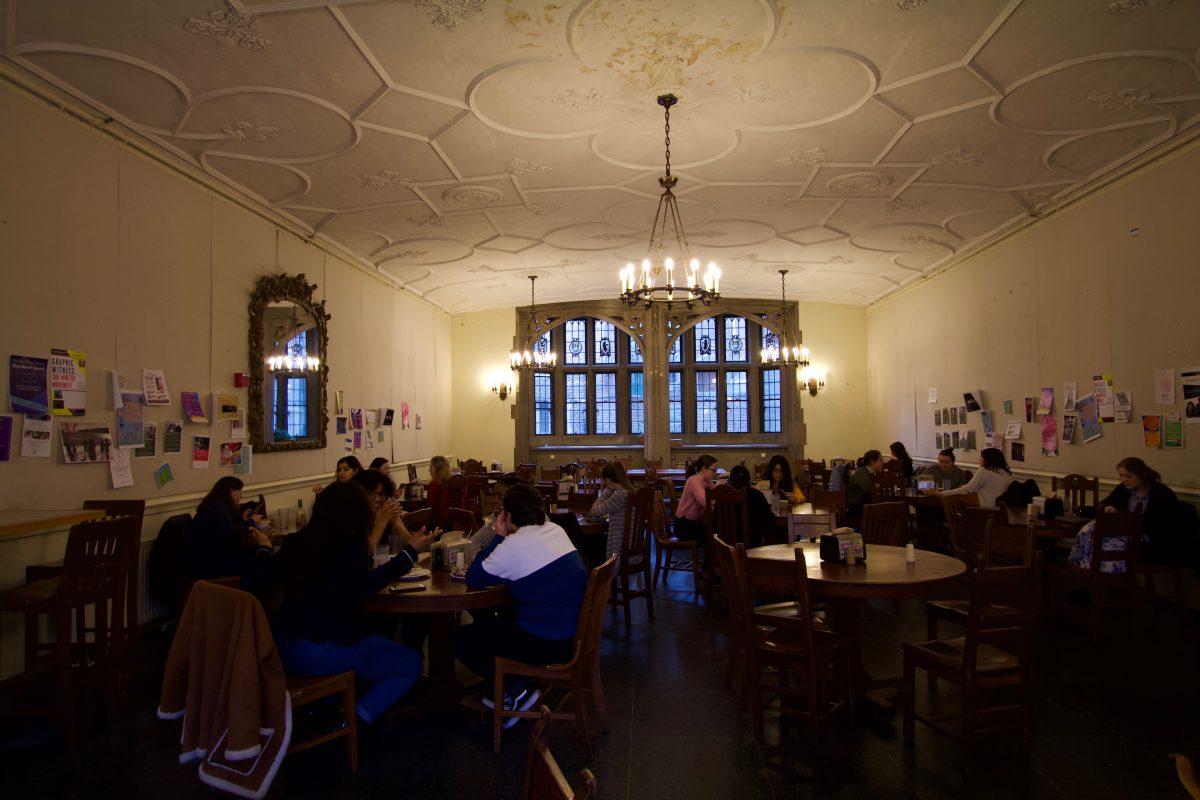Learning to read and write in a new language is always a challenge, but learning to converse in that language can be especially intimidating. Moreover, it can be difficult for foreign language students to find opportunities to engage in conversation with experienced speakers outside of the classroom. At Wellesley, a wide variety of language tables exist for this very reason. Language tables make verbal communication in foreign languages available for beginners and seasoned speakers alike.
Language tables are facilitated by a number of different groups on campus. The Chinese table, for instance, is run by the Chinese Students Association (CSA), the Japan table by the Japan Club and the Korean table by the Korean Students Association (KSA). Other language tables, like French, Spanish, German and Hebrew, are run by language departments, international language assistants or by passionate students.
Talia Benheim ’21, who helped establish the new Hebrew language table earlier this semester, explained the origins of the project.
“A friend and I had both placed out of the Hebrew program when we came to Wellesley, and at the beginning of the year, we were talking about how we missed the language, so we talked to Professor Chalamish about starting Hebrew table, and now it happens weekly,” she said. Benheim added that Professor Gil Chalamish, who is a visiting lecturer in Wellesley’s Jewish Studies program, joins Hebrew table every week.
The Wellesley community members who attend language tables come from a variety of backgrounds. In addition to students who are currently enrolled in language courses and are seeking to supplement their in-class instruction, many attendees are former language students or native speakers.
“There are students who come who have taken Hebrew at Wellesley in the past or who speak the language at various levels from home or past schooling. Hebrew table is a way to keep the language in their lives here at Wellesley,”
Benheim said. In regards to the Japan Table, Elisabeth Clemmons ’20, who organizes the table as East Asian Languages and Cultures (EALC) Liaison of the Japan Club, noted, “We do get quite a few regular attendees at Japan table. We get a lot of different people from a lot of different levels, including people who aren’t taking Japanese classes, so Japan table is a great way to meet new people who you don’t see normally in class.”
The weekly language tables cover a wide range of subjects. Often, table facilitators will let attendees decide what they want to talk about rather than guiding the conversation in a particular direction.
“The topics change every week, but I try to let the conversation happen naturally, rather than restricting attendees to a certain topic. Though we somehow always end up talking about food,” said Ayla Han ’20, who serves as CSA’s community outreach chair and oversees the CSA Chinese table.
Benheim echoed that point in regards to topics discussed at the Hebrew table, emphasizing that the table is a laidback setting which gives students the opportunity to express more personal thoughts and ideas than they might in class.
“Our conversations tend to be casual and informal. We mainly talk about things that are going on in our lives and around campus. It’s not a classroom environment, so you don’t have to follow a structure or worry about making a mistake,” she said.
Total language immersion is often regarded as the most effective way to truly master a foreign tongue, but fears of miscommunication often prevent language students from honing their language skills when the chance does arise in everyday life or travels. The beauty of Wellesley’s language tables is that they provide immersion in a safe and controlled space. Mistakes are totally acceptable, and students often find that they can address specific weaknesses in their language skills.
Reflecting on common misconceptions about language tables, Han noted that Wellesley students tend to assume that only Chinese students can attend the Chinese table or that attendees need to be fully fluent in order to participate.
“The goal of Chinese table is to provide a community and support system for anyone interested in Mandarin and/ or China. It’s a place where we should all feel welcome and comfortable improving our Mandarin and learning about China together. So if anything, Chinese table is more for those with less experience in Mandarin!” she added.
Clemmons, who emphasized that the Japan Table has no language background requirements besides an interest in learning the language and culture, said that interested students should not hesitate to attend language tables.
“It can be nerve-wracking to be in a language-immersive environment, and students may be afraid of coming because they feel self-conscious about how they perform,” she said. “My advice to these students is just dive in and take that first step—no matter your level, we want you to feel welcome and get the practice you need! We’re not going to judge you for making mistakes, and we’re just in general a super chill group of people to hang with.”






